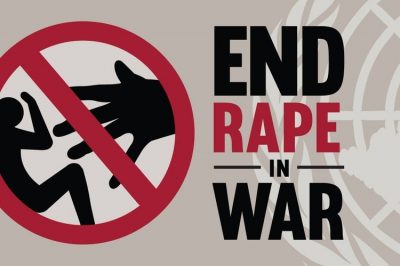New York, 19 June 2023 (WAI): On June 19, the world marked the International Day for the Elimination of Sexual Violence in Conflict. This annual occurrence acts as a heartbreaking awareness of the critical need to address and eradicate the tragic effects of sexual assault in armed conflict. It is a chance to raise awareness, advocate for justice, and promote healing for survivors.
Sexual violence remains a horrific and widespread tactic used in conflicts around the world. Disturbing statistics reveal the scale of this issue: approximately one in three women will experience some form of sexual assault in her lifetime, with even higher rates reported in conflict-affected areas.
Men, boys, and gender non-conforming individuals also face these severe violations. Sexual violence not only inflicts immediate physical and psychological trauma but can also perpetuate cycles of violence, destroy communities, and hinder peacebuilding efforts.
The International Day for the Elimination of Sexual Violence in Conflict aims to shed light on this grave issue, demand accountability, and galvanize global action. It underscores the importance of recognizing sexual violence as a crime against humanity, demanding an end to impunity for perpetrators, and securing justice for survivors. It is crucial that survivors are supported, their voices amplified, and their rights protected.
The United Nations Security Council Resolution 2467, adopted unanimously in April 2019, reaffirms the international community’s commitment to combating sexual violence in conflict and emphasizes the importance of prevention, protection, and accountability. This resolution is a significant step towards addressing the issue comprehensively, providing a framework for action, and ensuring that survivors receive the necessary support.
Civil society organizations, governments, and individuals worldwide are organizing events and campaigns to mark the International Day for the Elimination of Sexual Violence in Conflict. These initiatives aim to educate communities, foster dialogue, and advocate for policy changes that will strengthen prevention efforts, enhance support systems for survivors, and ensure justice through effective legal frameworks.
The eradication of sexual violence in conflict requires a collective effort. Governments must strengthen laws, policies, and institutions to prevent and respond to such crimes. Communities must challenge harmful gender norms and promote gender equality. Educational institutions must include comprehensive and age-appropriate programs on consent, gender-based violence, and respect. And individuals can contribute by speaking out against all forms of violence and supporting survivors in their healing journey.
On the occasion of the International Day for the Elimination of Sexual Violence in Conflict, United Nations Secretary-General António Guterres issued a powerful message highlighting the urgent need to address the alarming rise of sexual harassment and gender-based hate speech, particularly in the digital space.
Also Read: Pakistani Embassy honors Romanian blouse tradition
Conflict-related sexual violence has persisted as a reprehensible tactic of war, torture, and terrorism, inflicting immeasurable suffering on women, girls, men, and boys of diverse backgrounds. The Secretary-General emphasized that the proliferation of conflicts, the illicit proliferation of arms, and increased militarization have contributed to a distressing surge in sexual violence within conflict zones.
Moreover, these conflicts have also led to a shrinking civic space, making it increasingly challenging for human rights defenders, activists, and journalists to raise their voices and address the root causes of such atrocities. The Secretary-General expressed deep concern over the rising reprisals faced by those who strive to protect and promote human rights in these difficult circumstances.
In his message, Secretary-General Guterres highlighted the digital realm as a platform that has empowered vulnerable groups and enabled the propagation of violence. While information and communications technology has played a vital role in advancing the rights of women, girls, and other marginalized communities, it has also witnessed a disturbing surge in gender-based hate speech and harassment. Gender-based hate speech and incitement to violence have become rampant in specific settings, exacerbating conflicts and destabilizing targeted communities.
The Secretary-General emphasized the link between hate speech, including online, and the use of sexual violence to humiliate and undermine these communities. Hate speech, he warned, has emerged as one of the most pervasive tools for spreading divisive rhetoric on a global scale.
Secretary-General Guterres urged governments, civil society organizations, and individuals worldwide to confront bigotry head-on and take decisive action to combat the hate that spreads like wildfire across the internet. He stressed the importance of enhancing access to technology while ensuring accountability for actions taken online.
The United Nations stands ready to support initiatives to prevent and end sexual harassment and gender-based hate speech. Through collaborative efforts, we can foster a safe and inclusive digital space that empowers individuals, promotes respect for human rights, and contributes to eliminating sexual violence in conflict.
The International Day for the Elimination of Sexual Violence in Conflict serves as a solemn reminder of our shared responsibility to protect the rights and dignity of all individuals, particularly those who have endured the horrors of conflict-related sexual violence. As Secretary-General Guterres concluded, “Only by standing together can we build a world where no one is subjected to the scourge of sexual violence.”
As we observe the International Day for the Elimination of Sexual Violence in Conflict, let us unite to demand justice and healing for survivors, advocate for policy changes, and work towards a world where no one experiences the horror of sexual violence in times of conflict. Together, we can create lasting change and build a future free from the scourge of sexual violence.
International Relations Scholar interested in National Security strategies, with a good focus on Geo-Politics, Foreign Policy, and Public & Cultural Diplomacy.








